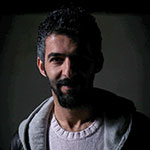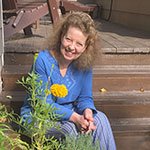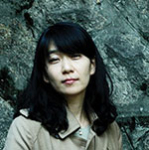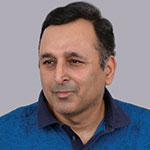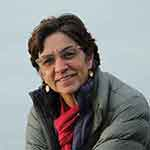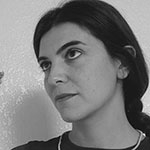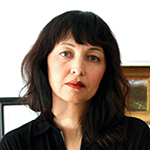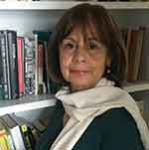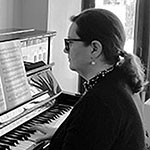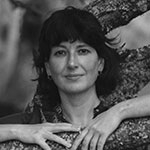Find your favorite authors featured in WLT or browse the entire list.
Mohammed Kadalah
Mohammed Kadalah has most recently published translations and short prose in Lyrikline and in the anthology Voices of the Arab Spring. Born and raised in Syria, he currently teaches Arabic at the University of Connecticut.
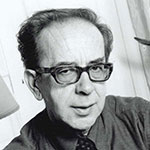
Photo by J. Foley Opalediv>Ismail Kadare
Ismail Kadare is Albania’s best-known poet and novelist. In 2005 he was awarded the inaugural Man Booker International Prize for “a body of work written by an author who has had a truly global impact.” He is also the recipient of the 2009 Prince of Asturias Prize in Spain, and in 2015 he won the Jerusalem Prize for the Freedom of the Individual in Society. Kadare was the 2020 laureate for the Neustadt International Prize for Literature.
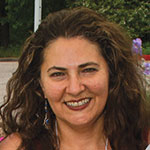
Photo © Wendi LaFaydiv>Mohja Kahf
Mohja Kahf’s second book of poetry, Hagar Poems, was published by the University of Arkansas Press in 2016. Her novel, The Girl in the Tangerine Scarf, was published in 2006. Kahf is a professor of comparative literature and Middle East studies at the University of Arkansas.
Adrianne Kalfopoulou
Adrianne Kalfopoulou is the author of two poetry collections, most recently Passion Maps (Red Hen Press, 2009). Her poems and essays have appeared in various journals, including Hotel Amerika, Room magazine, and Prairie Schooner. She is on the faculty at Hellenic American University and teaches in the Creative Writing Program at New York University.
Joudie Kalla
Joudie Kalla is a chef who trained in London’s finest restaurants. She is the author of two best-selling Palestinian cookbooks, Palestine on a Plate and Baladi. Her work ranges from food consulting to philanthropy, and using her cookbooks she helped rebuild a school in Nablus for children with The House of Friendship.
Yalie Kamara
Yalie Kamara is a Sierra Leonean American writer, educator, and researcher from Oakland, California. She is the author of A Brief Biography of My Name (2018) and When the Living Sing (2017). Kamara’s writing can be found in Poetry Daily (Poetry Society of America), Adroit, Callaloo, and elsewhere. Kamara has been a finalist for the National Poetry Series competition and the Brunel International African Poetry Prize.
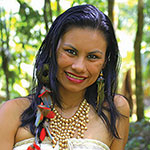
Photo © Agência Paradiv>Márcia Wayna Kambeba
Márcia Kambeba, of the Omágua/Kambeba indigenous people in Brazil, is the author of Ay kakyri Tama – Eu moro na cidade (2013). She’s a writer, composer, poet, activist, photographer, performer, and public speaker on indigenous and Amazonian subjects. With a master’s degree in geography, she offers workshops and storytelling throughout Brazil and abroad.
Nour Kamel
Nour Kamel (she/they) writes and edits things in Egypt. Their chapbook Noon is part of the New-Generation African Poets series, and their writing can be found in Anomaly, Rusted Radishes, Ikhtyar, Sukoon, 20.35 Africa, Sumou, and Mizna. They helped create and facilitate writing workshops at the Contemporary Image Collective, which led to the publication of The Taste of Letters / طعم الحروف and Our Bodies Breathe Underwater / أجسادنا تتنفس تحت الماء.
Ilya Kaminsky
Ilya Kaminsky is the author of Dancing in Odessa (Tupelo) and Deaf Republic (Graywolf). He was a finalist for the National Book Award and won the Los Angeles Times Book Award. He is the translator and editor of many other books.
Beena Kamlani
Beena Kamlani’s fiction won a 2009 Pushcart Prize and has appeared in Identity Lessons and Growing Up Ethnic in America as well as Ploughshares, Virginia Quarterly Review, The Lifted Brow 4 (Australia), and other collections. She is an editor at Viking Penguin and an associate professor of publishing at New York University. Kamlani lives in New York and is completing a novel.
Ken N. Kamoche
Ken N. Kamoche (kenkamoche.com) was born and raised in Kenya. He studied commerce at the University of Nairobi and management at Oxford where he was a Rhodes Scholar. He is an academic, journalist, and writer of fiction. Kamoche's collection of short stories, A Fragile Hope (Salt, 2007) was shortlisted for the Commonwealth Best First Book Award. His other stories have appeared in various anthologies, including Hong Kong ID, Dreams, Miracles and Jazz, One World, and New Writing from Africa 2009, as well as several magazines. Kamoche has also been a columnist for Kenyan newspapers. He currently lives in the United Kingdom. His new novel, True Warriors, was first published as a short story in Crossing Borders, a British Council magazine.
Yana Kane
Yana Kane came to the United States as a refugee from the USSR. She holds a BSE from Princeton University and a PhD in statistics from Cornell University. She is pursuing an MFA in creative writing at Fairleigh Dickinson University. View.Point recognized her translations as among the “Best of 2022.” She won the 2023 RHINO Poetry Translation Prize.
Han Kang
Born in South Korea in 1970, Han Kang made her literary debut as a poet in 1993. She has since published novels and short fiction and won the Yi Sang Literary Prize, the Today’s Young Artist Award, and the Manhae Literary Prize. She currently works as a professor in the Department of Creative Writing at the Seoul Institute of the Arts. The Vegetarian, Deborah Smith’s English translation of one of Han Kang’s five novels, has been shortlisted for the 2016 Man Booker International Prize.
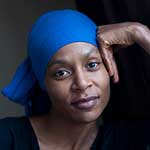
Photo: Thomas Langdondiv>Fabienne Kanor
Born in France to Caribbean parents, Fabienne Kanor teaches French and francophone literature and cinema at Penn State University. An award-winning writer and filmmaker, she has directed many movies (mostly documentaries) and published seven novels, including Faire l’aventure (2014), Je ne suis pas un homme qui pleure (2016), Louisiana(2020), and, in 2018, translated into French Zora Neale Hurston’s Barracoon: The Story of the Last “Black Cargo.” Awarded the “Chevalier des Arts et des Lettres” by the French Ministry of Culture, Kanor devotes her career to studying race, gender, and migrations in France and francophone Africa. Her novel Humus, about fourteen enslaved African women, was published in September by University of Virginia Press.
Vikram Kapur
Vikram Kapur (www.vikramkapur.com) is the author of two novels. He has also published several short stories and pieces of nonfiction. His stories have been shortlisted in a number of international competitions. He is currently an associate professor of English at Shiv Nadar University.
Zvonko Karanović
Zvonko Karanović is a poet and fiction writer born in Niš, Serbia. Like the poets of the Beat generation he takes as his models, he has traveled widely throughout Europe, hitchhiking and often changing jobs. He has worked as a journalist, editor, radio host, DJ, concert organizer, and for thirteen years was the owner of a music store. He has published ten collections of poems and a novel trilogy, The Diary of Deserters.
Persis M. Karim
Persis M. Karim is Professor of English and comparative literature at San Jose State University in California, where she teaches world literature, comparative literature, and creative writing. She is a contributing poet to the Al-Mutanabbi Street Starts Here anthology and has been involved with the project since 2008.
Persis Karim
Persis Karim is a poet, editor, and professor of comparative and world literature at San Francisco State University, where she also serves as director of the Center for Iranian Diaspora Studies. She has been involved with the Al-Mutanabbi Starts Here project since 2007, contributing to the anthology, broadside, and, more recently, to “Shadow and Light” projects. She is the editor of three anthologies of Iranian diaspora literature; her own poetry has appeared in numerous publications including Callaloo, Reed Magazine, Raven’s Perch, New York Times, Essential Voices: Poetry of Iran and Its Diaspora, and others.
Ziaul Karim
Ziaul Karim is executive editor of Jamini, an international arts magazine, and former literary editor of The Daily Star.
Nilufar Karimi
Nilufar Karimi is an Iranian American poet and translator. Her works have appeared in West Wind Review and Alchemy Journal of Translation and on behalf of the San Diego Asian Film Festival of the Pacific Arts Movement.
Fowzia Karimi
Fowzia Karimi is a writer and an illustrator. Her illuminated debut novel, Above Us the Milky Way, was released in 2020. She has illustrated Faust, by Johann Wolfgang van Goethe (translated by Zsuzsanna Ozsváth and Frederick Turner); The Brick House, by Micheline Aharonian Marcom; and Vagrants and Uncommon Visitors, by A. Kendra Greene. She is a recipient of the Rona Jaffe Foundation Writers’ Award.
Ghada Karmi
Ghada Karmi is a doctor of medicine, an academic until recently at the University of Exeter, and a political analyst and commentator on the Israeli-Palestinian conflict. She has written several books, including two memoirs, In Search of Fatima and Return.
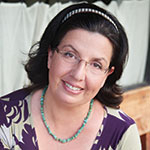
Photo: Gal Hermonidiv>Alit Karp
Alit Karp is a literary critic for Israel’s daily newspaper, Haaretz. She frequently authors opinion columns on issues related to minority rights and freedom of speech in Israel. Her story “The Princess” appeared in Asymptote in 2016 and was selected by the Guardian (UK) for its Translation Tuesday feature. Her story “Made Flesh” was published in 2017 by World Literature Today. Her book Geese: Travel Impressions from Sweden was published in 2018 by Afik – A Channel for Israeli Literature.
Bill Kartalopoulos
Bill Kartalopoulos is series editor for the Best American Comics series. He also teaches comics history and the graphic novel at Parsons The New School for Design and the School of Visual Arts. He is currently working on a general history of American comics for Princeton University Press.
Firoozeh Kashani-Sabet
Firoozeh Kashani-Sabet is a novelist and a professor of Middle Eastern history at the University of Pennsylvania. Her creative work follows the treacherous path of politics by intruding into people’s personal lives and private spaces. Through her poems and stories, she explores some of the themes of her academic research, including alienation, prejudice, power, love, and violence.
Niva Kaspi
Niva Kaspi is well into her PhD candidacy with the University of Western Australia. Her research is on translations in and of David Grossman’s writing, exploring notions of translatability and the position of translators within the work. She is also a Hebrew-English translator and a lecturer in communication at Edith Cowan College in Perth, where she is involved in projects to enhance language proficiency among students from non-English-speaking backgrounds.
Kapka Kassabova
Kapka Kassabova is a poet and writer. Border (2017) and To the Lake (2020) explore the human geography of the southern Balkans. Border won the British Academy’s Al-Rodhan Prize, the Saltire Book of the Year, the Stanford-Dolman Book of the Year, and was shortlisted for the National Book Critics Circle Award, the Prix européen du livre, and the Angelus Award.
Slađana Kavarić
Slađana Kavarić is a Montenegrin author. She writes poetry and short stories. To date, she has published two books of poetry: Memory (Sjećanje, 2010) and People from Nowhere (Ljudi niotkuda, 2016). She was born in Podgorica in 1991.
Mieko Kawakami
Mieko Kawakami (b. 1976) is the author of Breasts and Eggs (original title: Natsu monogatari), which was selected for the New York Times’ 100 Notable Books in 2020 and Time’s 10 Best Books in 2020. Her other novels, Heaven and All the Lovers in the Night, are also forthcoming in English. She has received numerous prestigious literary awards in Japan, including the Akutagawa Prize, Tanizaki Prize, and the Murasaki Shikibu Prize. She lives in Tokyo.
Pagination

